Court Marriage in Karachi, Islamabad & Lahore-Pakistan: Procedure of Registration
Court Marriage in Karachi, Islamabad and Lahore: Legal Procedures
Court marriage in Karachi, Islamabad, and Lahore has become a significant and practical choice for couples seeking a simple and legally recognized union. It provides a formal process that adheres to the legal framework of Pakistan, ensuring that the rights of both parties are protected. This article outlines the essential legal procedures for court marriage in these major cities, offering guidance to couples looking for a hassle-free experience.

Legal Requirements for Court Marriage
To initiate the court marriage process in Karachi, Islamabad, or Lahore, couples must fulfill specific legal requirements:
Age Requirement: Both parties must meet the minimum legal age for marriage, which is 18 years for women and 21 years for men under Pakistani law.
Mutual Consent: Both individuals must willingly agree to the marriage without any coercion. Mutual consent is a fundamental aspect of the process.
Documentation: The essential documents required include:
Valid CNIC (Computerized National Identity Card) or a passport for both parties.
Two passport-sized photographs of each individual.
An affidavit confirming the single status of both parties or proof of divorce/widowhood, if applicable.
A marriage declaration form signed by both parties.
Witnesses: At least two adult witnesses are required to be present during the marriage ceremony and registration.
Steps Involved in Court Marriage
The court marriage process involves several key steps that ensure the union is legally recognized:
Application Submission: Couples must submit an application for marriage to the relevant authorities. This is usually done at a family court or a designated registrar’s office.
Verification of Documents: The submitted documents are verified to ensure authenticity. Couples must ensure that all paperwork is complete and accurate to avoid delays.
Marriage Ceremony: The Nikah (marriage contract) is solemnized by a Nikah Khawan (religious officiant) in the presence of witnesses. The Nikah Nama (marriage certificate) is signed and registered.
Registration: The marriage is formally registered with the Union Council or relevant authority. Couples are advised to obtain multiple copies of the registered Nikah Nama for future use.
Court Appearance: In some cases, a court appearance may be required where the judge ensures that the marriage is consensual and complies with legal requirements.
Importance of Legal Assistance
Engaging the services of an experienced court marriage lawyer is crucial for a smooth process. Lawyers can provide guidance on:
Preparing and verifying documentation.
Navigating legal complexities.
Representing the couple in court, if necessary.
Their expertise ensures that all legal formalities are completed efficiently, saving time and reducing stress for the couple.
Unique Aspects in Karachi, Islamabad, and Lahore for Court Marriage
Each city has its unique administrative processes and cultural considerations:
Karachi: Being the largest city, Karachi has multiple family courts and registrars to accommodate the high volume of cases. Couples should ensure they select a convenient and reputable office.
Islamabad: As the capital city, Islamabad emphasizes adherence to legal protocols. Documentation must be precise, and procedures are often strictly monitored.
Lahore: Known for its rich cultural heritage, Lahore offers a blend of traditional values and modern legal practices, making court marriage a widely accepted option.
Benefits of Court Marriage
Court marriage offers numerous advantages, including:
Legal Recognition: It ensures that the marriage is officially documented and recognized by law.
Simplicity: The process is straightforward and eliminates the need for elaborate wedding arrangements.
Protection of Rights: Both parties are granted legal rights and responsibilities, safeguarding their interests.
Final Thoughts
Court marriage in Karachi, Islamabad, and Lahore is a reliable and efficient way for couples to formalize their union. By understanding the legal procedures and seeking professional assistance, couples can navigate the process with ease and confidence. Whether facing societal pressures or simply seeking a straightforward path to marriage, court marriage provides a secure and legally sound solution for a lifetime commitment.
Add Your Heading Text Here
Navigating the Essential Procedures and Requirements of Court Marriage in Karachi
In Karachi, court marriage involves a legal process overseen by the local authorities. Couples intending to marry must follow specific procedures laid out by the relevant courts. These procedures typically include submitting necessary documentation, attending court hearings, and obtaining a marriage certificate. Understanding these procedures is essential for couples embarking on court marriage in Karachi.
Legal Requirements for Court Marriage in Karachi
Specific legal requirements must be fulfilled to solemnize a court marriage in Karachi. These requirements usually include proof of identity, age, and marital status of the individuals seeking to marry. Additionally, witnesses may be required to attest to the validity of the marriage. Fulfilling these legal prerequisites ensures that the court marriage process in Karachi adheres to the established legal framework.
Importance of Court Marriage in Karachi
Court marriage is essential in Karachi as it provides couples with a legally recognized union. In a city where cultural and societal norms may pose challenges to traditional marriage, court marriage offers a viable alternative. It grants couples the freedom to marry regardless of religious or cultural differences, promoting equality and personal choice in Karachi’s diverse society.
Process of Court Marriage Registration in Karachi
The process of registering a court marriage in Karachi involves several steps aimed at legalizing the union. After completing the necessary paperwork and obtaining consent from both parties, the couple must appear before a magistrate or judge for solemnization. Following the ceremony, the marriage is registered, and a marriage certificate is issued, affirming the legality of the union under Karachi’s jurisdiction.
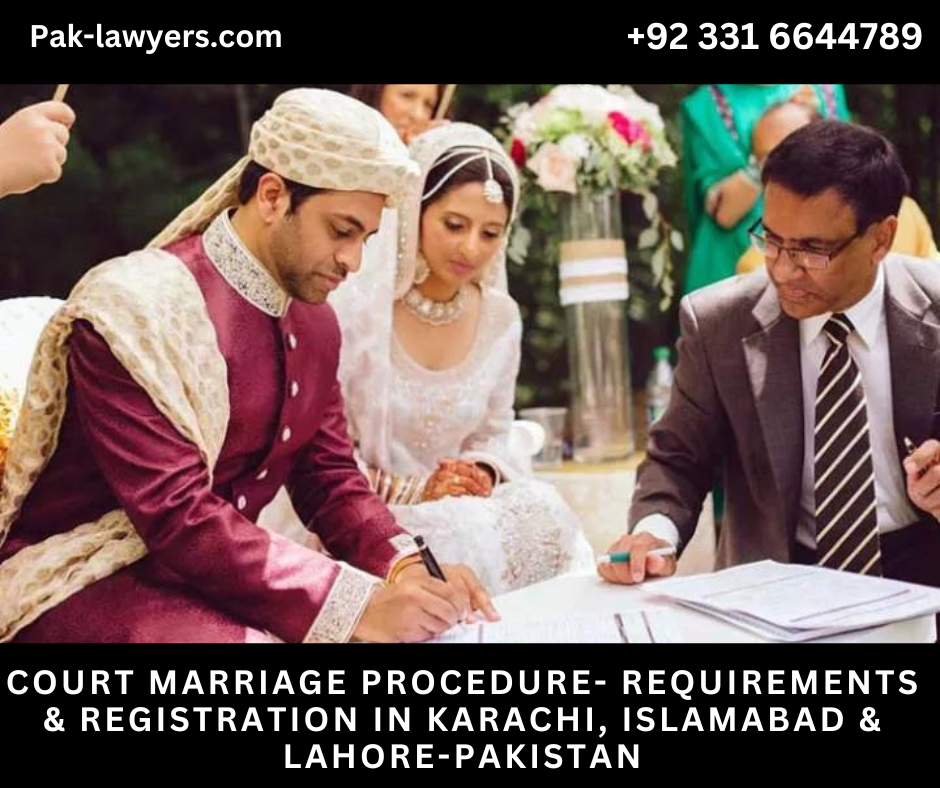

Court Marriage vs. Traditional Marriage: A Comparison
Court marriage and traditional marriage differ significantly in their procedures and legal implications. While conventional marriage often involves elaborate ceremonies and religious rituals, court marriage is a more straightforward, streamlined process under legal supervision. In Karachi, couples may choose between the two based on their preferences, cultural backgrounds, and legal considerations.
Benefits of Opting for Court Marriage in Karachi
Opting for court marriage in Karachi offers various benefits, including simplicity, legality, and flexibility. Unlike traditional marriage, court marriage requires minimal paperwork and avoids the complexities associated with religious ceremonies. Additionally, court marriage provides legal recognition and protection for the couple’s rights and obligations, ensuring peace of mind and security in Karachi’s dynamic environment.
Documents Required for Court Marriage in Karachi
Couples must provide certain essential documents to initiate the court marriage process in Karachi. These typically include valid identification documents such as national identity cards or passports, proof of age, and residence. Additionally, affidavits may be required to affirm the individual’s marital status and consent to marry. Ensuring the availability and authenticity of these documents is crucial for a smooth court marriage procedure in Karachi.
Court Marriage: A Convenient Option for Couples in Karachi
Court marriage offers a convenient option for couples in Karachi seeking a hassle-free and expedited marriage process. Court marriage provides a straightforward and efficient alternative by bypassing the elaborate ceremonies and cultural traditions associated with traditional marriage. This convenience is especially beneficial for couples facing time constraints or logistical challenges in Karachi’s bustling urban environment.
Court Marriage Process Explained: Karachi Perspective
In Karachi, the court marriage process follows a specific legal framework designed to ensure the validity and legality of the union. Couples must apply with the relevant court, providing necessary documents and details about their intended marriage. Subsequently, a court hearing is scheduled, during which the magistrate or judge solemnizes the marriage. The marriage is registered after the ceremony, and a certificate is issued, marking the culmination of the court marriage process in Karachi.
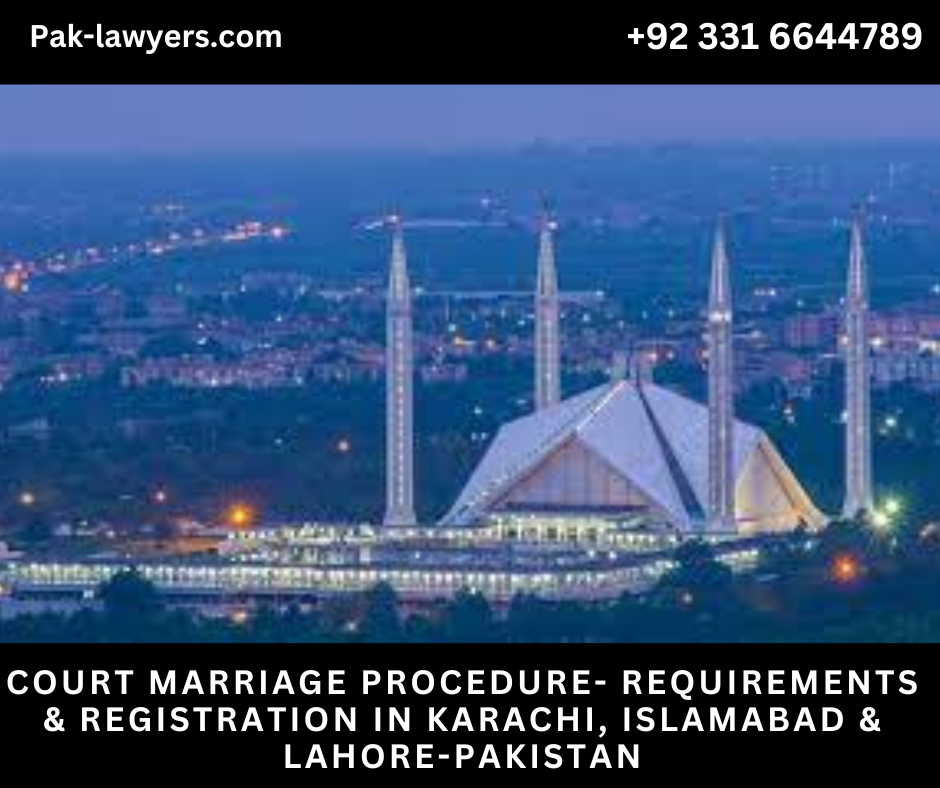
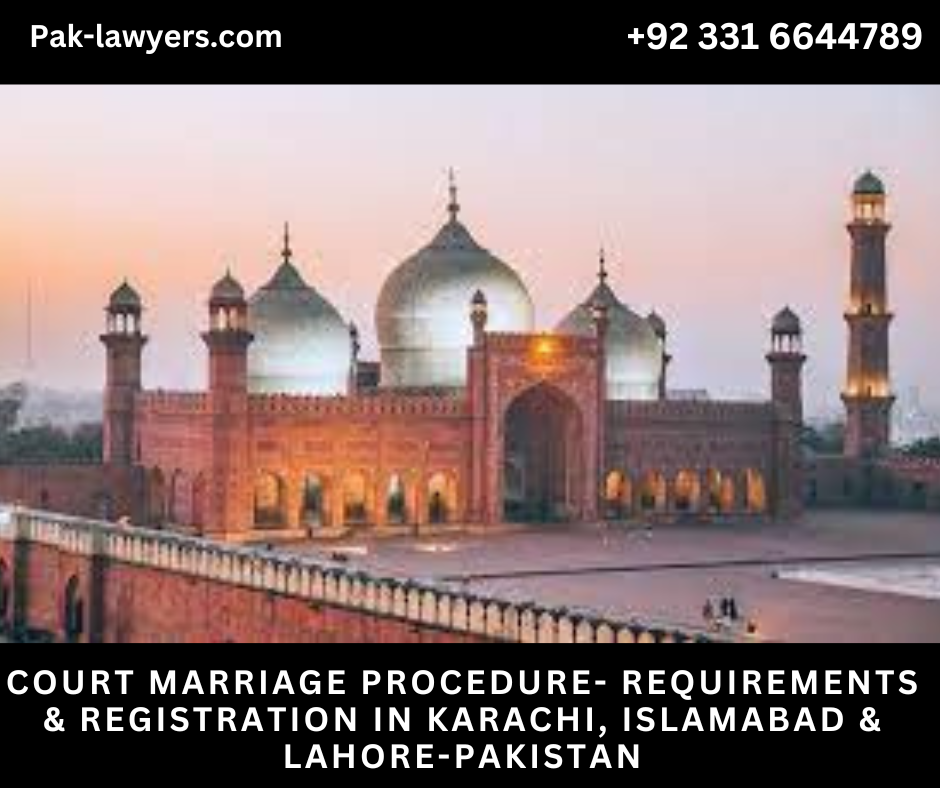
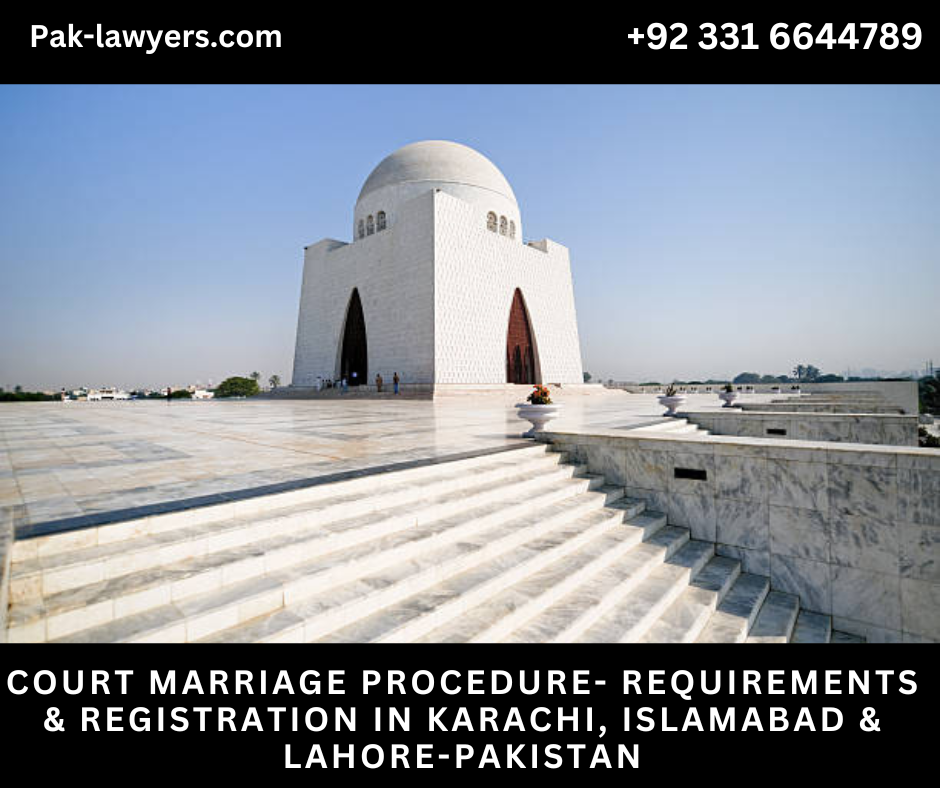
Factors to Consider Before Opting for Court Marriage in Karachi
Before opting for court marriage in Karachi, couples should consider various factors that may impact their decision. These include legal implications, familial and societal expectations, and personal preferences. Additionally, couples must assess their readiness for marriage, financial stability, and compatibility. By evaluating these factors thoughtfully, couples can decide whether court marriage is proper in Karachi’s diverse social landscape.
Court Marriage: Simplifying Union in Karachi
In Karachi, court marriage simplifies the union process by offering a straightforward legal alternative to traditional ceremonies. Couples can avoid the complexities and expenses associated with elaborate weddings, focusing instead on the essence of their commitment. This simplicity appeals to many couples in Karachi seeking a pragmatic approach to marriage without compromising its significance.
Court Marriage: A Legal Perspective in Karachi
From a legal standpoint in Karachi, court marriage provides couples with a formal recognition of their union under the law. It ensures the marriage is legally binding and enforceable, granting spouses rights and protections afforded by marital laws. This legal perspective underscores the importance of court marriage as a valid and legitimate means of formalizing relationships in Karachi.
Court Marriage: Ensuring Legal Recognition in Karachi
Court marriage ensures legal recognition for couples in Karachi, granting them rights and privileges accorded to married individuals. By obtaining a marriage certificate through the court, couples establish their legal status as spouses, enabling access to benefits such as inheritance rights, healthcare coverage, and property ownership. This recognition enhances the security and stability of unions in Karachi’s diverse society.
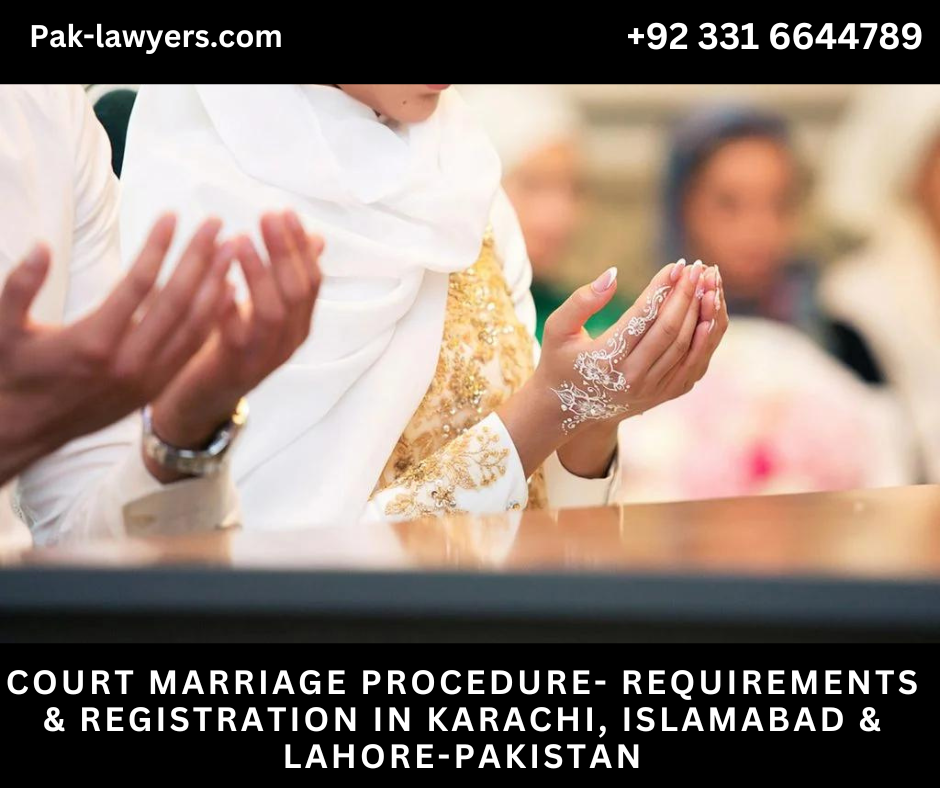
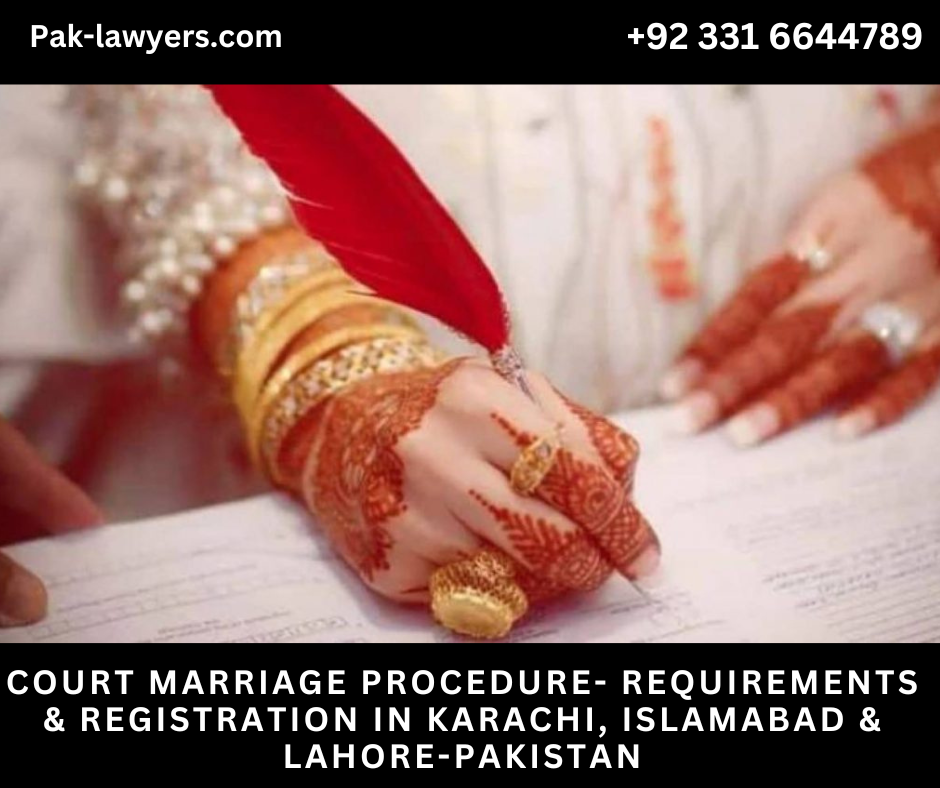
Court Marriage: The Role of Authorities in Karachi
In Karachi, authorities oversee the court marriage process to ensure its legality and validity. Magistrates and judges preside over marriage solemnization ceremonies, verifying the consent and eligibility of the parties involved. Additionally, court officials facilitate the registration of marriages, issuing official certificates that attest to the union’s legality under Karachi’s jurisdiction.
Common Misconceptions about Court Marriage in Karachi
Despite its prevalence, court marriage in Karachi is often surrounded by misconceptions. One common misconception is that court marriage needs to have cultural or religious significance. However, court marriage offers an alternative legal framework for solemnizing unions, accommodating diverse beliefs and preferences. Dispelling such misconceptions is essential for promoting understanding and acceptance of court marriage in Karachi.
Planning a Court Marriage Ceremony in Karachi
Planning a court marriage ceremony in Karachi involves several considerations to ensure a smooth and meaningful experience. Couples can personalize the ceremony by selecting readings, vows, and rituals that resonate with their values and beliefs. Additionally, coordinating logistics such as venue, officiant, and witnesses is crucial for a seamless execution. With careful planning, couples can create a memorable court marriage ceremony in Karachi that reflects their unique bond.
Court Marriage: Facilitating Union in Karachi Society
Court marriage plays a significant role in facilitating unions within Karachi society by offering a legally recognized framework for marriage. This inclusive approach accommodates couples from diverse backgrounds and beliefs, promoting unity and acceptance. Court marriage contributes to the cohesion and harmony of Karachi’s multicultural community by providing a common platform for solemnizing marriages.
Navigating Religious and Cultural Differences in Court Marriage: Karachi Context
In Karachi, court marriage provides a neutral ground for navigating religious and cultural differences within unions. Couples from diverse backgrounds can opt for court marriage to avoid conflicts from differing traditions or beliefs. This pragmatic approach fosters understanding and compromise, allowing couples to prioritize their relationship over external expectations or prejudices.
Legal Rights and Obligations in Court Marriage: Karachi Laws
Under Karachi laws, court marriage confers legal rights and obligations upon spouses, similar to traditional marriages. These rights encompass inheritance, property ownership, spousal support, and child custody. Understanding these legal implications is crucial for couples embarking on court marriage in Karachi, ensuring clarity and protection for their future.
Court Marriage: Understanding the Registration Process in Karachi
Understanding the registration process is essential for couples intending to undergo court marriage in Karachi. After the solemnization ceremony, couples must register their marriage with the relevant authorities to obtain a legally recognized certificate. This process involves submitting required documents, paying fees, and adhering to specific procedures outlined by Karachi’s marriage registration laws.
Exploring the Cost of Court Marriage in Karachi
The cost of court marriage in Karachi varies depending on several factors, including legal fees, documentation expenses, and any additional services sought by the couple. While court marriage is generally more cost effective than traditional ceremonies, couples should budget for administrative costs and potential legal assistance to ensure a smooth process without unexpected financial burdens.

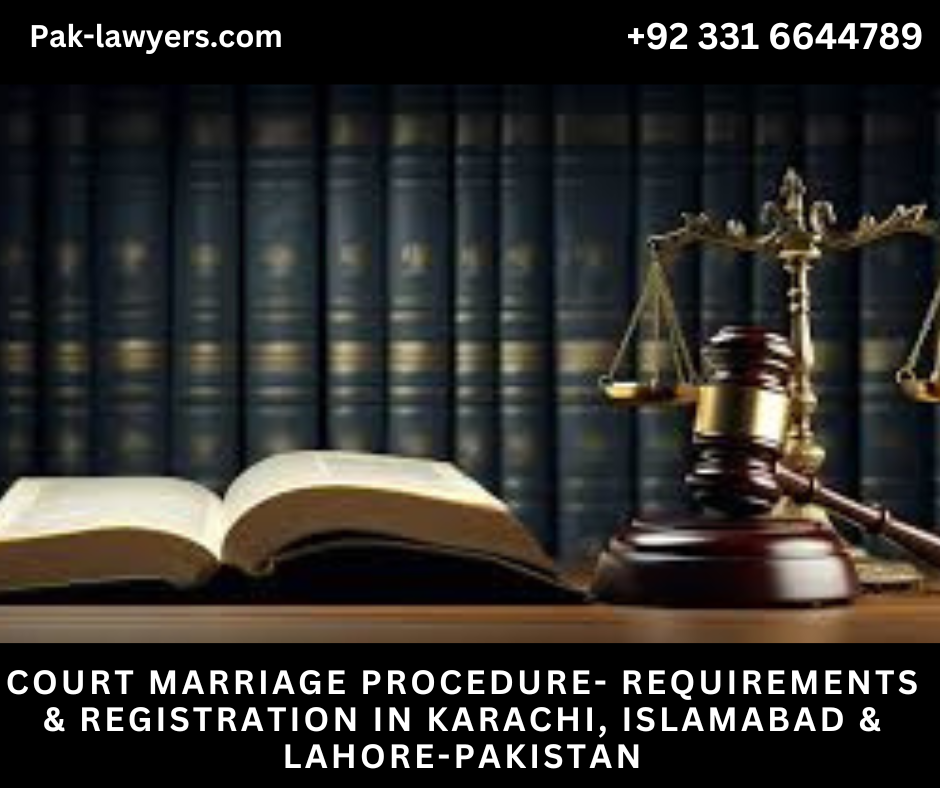
Court Marriage: Ensuring Privacy and Confidentiality in Karachi
Privacy and confidentiality are paramount in court marriage proceedings in Karachi. The legal framework ensures that couples’ personal information remains protected. With discreet court hearings and secure document handling, couples can rest assured that their privacy is respected, safeguarding them from unwanted attention or scrutiny in Karachi’s closely-knit communities.
Legal Assistance for Court Marriage in Karachi
In Karachi, couples seeking legal assistance for court marriage can benefit from professional guidance and support. Legal experts specialize in navigating the intricacies of marriage laws, assisting couples with documentation, procedural requirements, and any legal challenges that may arise. With knowledgeable assistance, couples can streamline the court marriage process, ensuring compliance with legal standards and minimizing potential obstacles.
Court Marriage: Addressing Common Concerns in Karachi
Addressing common concerns surrounding court marriage in Karachi is essential for dispelling misconceptions and promoting understanding. Key concerns may include the validity of court marriages, cultural acceptance, and familial approval. By providing accurate information and addressing misconceptions, stakeholders can alleviate anxieties and encourage acceptance of court marriage as a legitimate and respectable option in Karachi.
Court Marriage: Resolving Family Opposition in Karachi
Family opposition to court marriage is a common challenge couples in Karachi face. Open communication, empathy, and patience are crucial in navigating familial concerns and gaining acceptance. Educating families about the legal and social validity of court marriage and emphasizing the couple’s commitment and happiness can help alleviate opposition and foster familial support in Karachi’s traditional yet evolving society.
